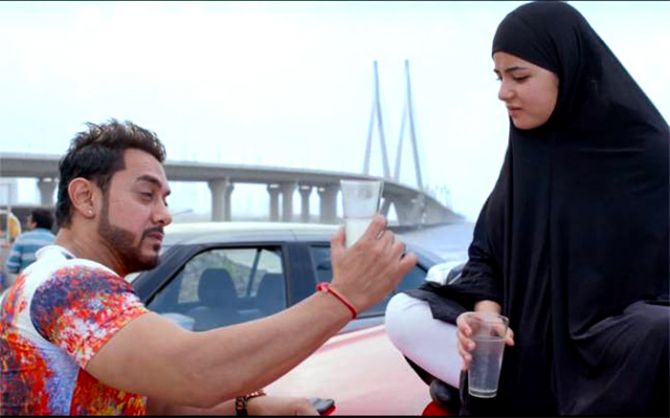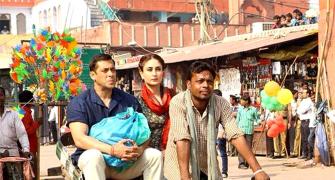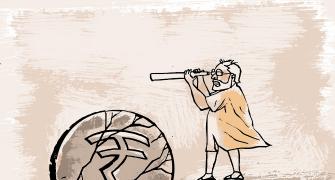'The Muslim identity of the family appears incidental to the subject of the film...'
'The self-sacrificing, suffering mother film could have belonged to any religion.''The abusive father, who prefers his son to his daughter, could have followed any religion.'
'That the Muslim household is remarkably free from religious symbolism is also the strength of the film,' feels Mohammad Asim Siddiqui.

Virginia Woolf, a major English novelist and one of the most influential figures in 20th century feminism, wrote in her diary for November 28, 1928: 'Father's birthday. He would have been... 96, yes, today; could have been 96, like other people one has known; but mercifully was not. His life would have entirely ended mine. What would have happened? No writing, no books; --inconceivable.'
The father in Secret Superstar is very much like Virgina Woolf's hypothetical father who will not allow creative expression in any form.
He is the textbook father of patriarchy in any age, any time -- unemotional, practical and a strict disciplinarian.
But coming out of the textbook, does he also appear convincing in a film which takes up the issue of the struggle of a girl child in a patriarchal family?
For the most part of the film he does not look too convincing, drawn as if to preach a cause.
But the film succeeds in other ways.
Early in the film the subject of the movie has been beautifully suggested by different kinds of meaningful shots.
The very first shot of a fast moving train connotes the idea of motion, movement and going forward which are not easily available to a girl child in a patriarchal set-up.
The shot leads to a view inside the compartment of the train where a slightly distant-looking school girl, who is on an excursion trip with other boys and girls her age, is sitting close to the window.
This shot follows a close-up of her beautiful fingers playing the guitar and a long shot of birds flying in the sky.
In a film objects, things and places are more than objects, things and places.
The window offers a peep into the outside world or rather a step that almost leads into the real world away from the confines of home, the guitar becomes a symbol of art, creativity, career and dreams and the flight of birds suggests escape, freedom and transcendence.
Later in the film, Saudi Arabia, mentioned in the film but not shown, becomes a metaphor for lack of freedom and the end of dreams, not of the father but that of the girl child.
The remarkable thing about Secret Superstar is that it shows a Muslim family based in Baroda, Gujarat, whose Muslim identity is never an issue in the film.
Too often in India gender discourse has been fractured along religious lines. In fact, one of the greatest obstacles before Indian feminism has been religious fundamentalism.
Support and help to women's issues becomes selective, based on one's religious and cultural preferences.
Brave feminist scholars and activists in India have had a hard time fighting religious fundamentalism.
Strangely, the Muslim identity of the family appears incidental to the subject of the film or it is relevant only within the confines of a Muslim household.
The self-sacrificing, self-abnegating, suffering mother in the film could have belonged to any religion.
Even a single instance of her offering prayers in the film is less an expression of religious beliefs and more of invoking God's blessings for her daughter.
The abusive and bad tempered father, who predictably prefers his son to his daughter, could have followed any religion.
That the Muslim household is remarkably free from religious symbolism is also the strength of the film as Muslim characters in Hindi films routinely announce their Muslimness through their rituals, mannerism and cliched Urdu expressions.
Interestingly, the veil and divorce, two important issues which are perpetually a part of discourse on Islam and Muslims, are taken up by the film in a very subtle manner.
Of the many arguments advanced against the veil, one argument is that it hinders the movement of a woman and hence affects her performance at work.
In an atmosphere of Islamophobia, the veil results in easy stereotyping of Muslim women.
A veiled woman often arouses curiosity and suspicion; she can face taunts and racial slurs; she can even be subjected to physical assaults.
In Secret Superstar, the veil is used as a trick to hide identity but rather than inhibit the woman who wears it, it contributes to her success.
The veil is not used in the film as a symbol of Muslim identity though it is used by a Muslim girl.
Life for the veiled woman in Secret Superstar appears perfectly normal and nowhere does she face any hindrance, any curious look, leave alone any untoward remark or taunt because of it.
It is too good to believe that the responses that she receives on social media -- otherwise, the hotbed of the worst kind of trolls on the basis of one's religion -- are free from any negative references to her veil.
That she lives in a mixed neighborhood in Gujarat, a place where there is a possibility of a Jignesh residing (as Chetan remarks in the film) makes it even more meaningful.
Is the film making a statement that the veil does not have an effect, good or bad, on one's performance and living?
Popular discourse on Muslim women makes it appear as if the threat of divorce by her man is always like an albatross around their neck.
Religion is often blamed for their powerlessness.
Secret Superstar subverts this idea. In the film it is not religion, but rather economics that determines the choice of the woman to leave or stay with her man.
The suffering woman has to tolerate her cruel husband, even invent reasons to like him, because he is the sole breadwinner in the family.
The climactic moment in her life when she decides to leave her husband comes when she has a hope that probably economics will take care of itself because her daughter can make a career in singing.
The film may have responded to the call 'Beti Padhao, Beti Bachao', but by treating its subject with some sensitivity and humour, and by presenting a resourceful girl protagonist, it contributes in its own way to creating an awareness about the status of a girl child in an average Indian family which happens to be Muslim.
Mohammad Asim Siddiqui teaches English at Aligarh Muslim University.
IMAGE: Zaira Wasim and Aamir Khan in Secret Superstar.









